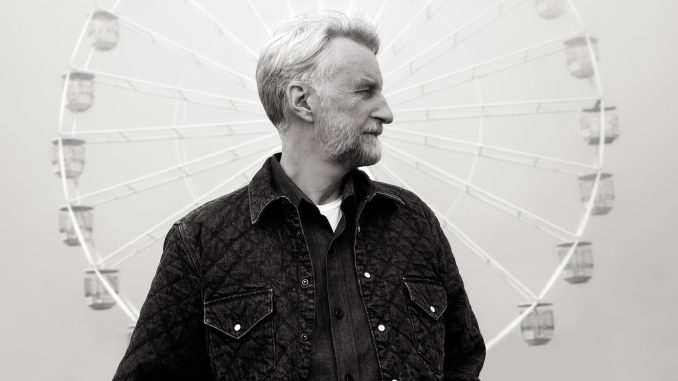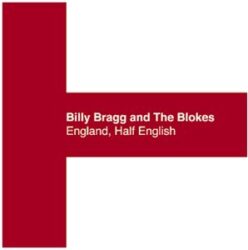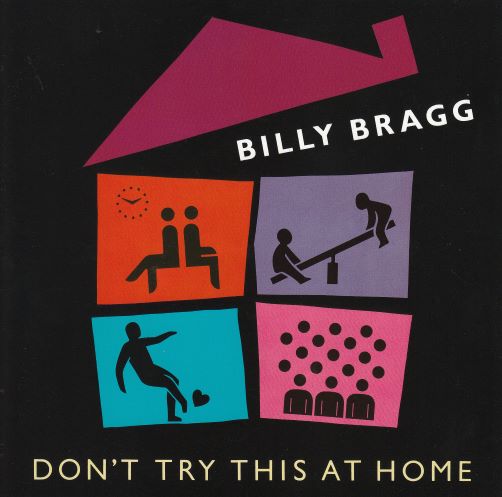
I first saw Billy Bragg play live on 30 December 1984 at the Lyceum Ballroom in the Strand in London. I used to be able to recall all the times I’d seen him perform but I lost count after the 50th gig. I’m guessing it’s close to 70 now, but who knows? Suffice to say I’ve seen him in concert more than any other artist. My first recollection of encountering the Bard of Barking was whilst watching the Channel 4 music programme The Tube, on which he made his TV debut, in October 1983. I was still mourning the breakup of The Jam a year earlier. His raw performance and politics struck a chord with me. It was just Bragg and his 1970s copy of a Gibson Les Paul TV Junior, electric guitar, which he’d stripped down to the bare wood. I was struggling with my studies, feeling that I was going nowhere and his song ‘To Have and to Have Not’ seemed to sum my situation up, “Just because you’re better than me doesn’t mean I’m lazy, Just because you’re going forward doesn’t mean that I’m going backwards”.
The day after Bragg’s TV appearance, I rushed out to the Our Price record shop in Bromley and bought his debut album “Life’s a Riot With Spy Vs Spy”. It’s a record which, although only clocking in at around 16 minutes long, still packs a punch. One critic aptly described it as “what happens when a Thatcher-hating Marxist discovers he loves Bob Dylan as much as the Sex Pistols”. It is a Bragg record that I can’t live without but it’s brevity and that fact that it plays at 45 rpm means that, after some thought, I’ve excluded it from consideration here; maybe I shouldn’t have, it’s an album that I still feel changed my life for the better. I’m glad that Bragg’s still out there doing his thing and supporting causes ranging from anti-racism and workers’ rights to LGBTQ+ inclusion and democratic reform.
Can’t Live With It: “England, Half English” (2002)
 “England, Half-English” is a curate’s egg of an album. It is the only one that Bragg recorded with his backing band The Blokes, whom he’d been playing live with for the previous four years before the recording of these songs. The album explores themes related to the social and cultural diversity of England. There are a number of musical styles on offer, ranging from ska to African-influenced guitar riffs.
“England, Half-English” is a curate’s egg of an album. It is the only one that Bragg recorded with his backing band The Blokes, whom he’d been playing live with for the previous four years before the recording of these songs. The album explores themes related to the social and cultural diversity of England. There are a number of musical styles on offer, ranging from ska to African-influenced guitar riffs.
The Blokes contributed the music to seven of the 12 tracks. As a massive Small Faces fan, one of the highlights of The Blokes for me was that they included Ian McLagan on piano and Hammond B3 organ. It’s his distinctive piano on ‘St. Monday’ which kicks the whole shebang off. The mish-mash of musical styles doesn’t always work as demonstrated by the title track, ‘England, Half English’. The lyrics show that Bragg’s heart is in the right place as he lists the provenance of various “English” icons and traditions such as St. George and Morris dancing but the ska and African fusion of the music grate slightly. The same is true of ‘NPWA’ about having ‘no power without accountability’. The themes of globalisation and its associated job losses, the unaccountability of large corporations, disillusionment with democracy and economic injustices are more pertinent today than when Bragg sang about them over 20 years ago. However, to these ears the music is slightly clumsy.
For me, ‘Take Down the Union Jack’ is the highlight of the album, this might be because it harks back to Bragg’s debut, because it features just him and a guitar. The release of the song as a single, in three different formats, was an ambitious attempt to get this critique of the monarchy and British imperialism to number one in the charts in June 2002, the week of the Queen’s Golden Jubilee. Alas it didn’t quite work with the single stalling at number 22 in the UK’s official chart, although it did get Bragg on Top of The Pops, singing about Gilbert and George and ‘the dear old Queen of England handing out those MBEs’.
The album certainly highlights Bragg’s continued political engagement, however, from my perspective the musical choices made don’t always gel, although the eclectic choices of arrangements certainly fit in with the album’s themes. In addition, unlike almost every other Bragg album, it lacks a standout love song such as ‘Greetings to the New Brunette’ or ‘St. Swithin’s Day’ as demonstrated by the drab ‘Another Kind of Judy’. Still, maybe it’s one of those albums that had to be made and it was interesting revisiting it to hear just how prescient Bragg was almost 25 years ago.
Can’t Live Without It: “Don’t Try This at Home” (1991)
 “Don’t Try This at Home” was Bragg’s shot at pop stardom. The production is more polished than his earlier records, and the album features a multitude of well known musicians on most of its 16 tracks including Danny Thompson and members of REM.
“Don’t Try This at Home” was Bragg’s shot at pop stardom. The production is more polished than his earlier records, and the album features a multitude of well known musicians on most of its 16 tracks including Danny Thompson and members of REM.
The new direction was first hinted at by the single ‘Sexuality’ which was released before the album. Co-written with Johnny Marr and featuring the ex-Smiths man’s sparkling guitar, as well as Kirsty MacColl on backing vocals, it’s a song that celebrates sexual freedom and inclusivity. At a time when Section 28 was still in place and the AIDS crisis was at its zenith, singing “Just because you’re gay, I won’t turn you away” in a song aimed at the pop charts was a bold move. In recent years, Bragg has updated this line to “Just because you’re they, I won’t turn you away, If you stick around, I’m sure that we can find the right pronoun”. Back in 1991, on its release, the NME said it was “the funniest and most determined record of the week”, praising its “spunky melody” and clever rhymes, however, despite this it only made it to number 27 on the UK singles chart.
‘Trust’ also sensitively touches upon a sexual encounter. The lyrics are ambiguous enough that it could be about the fear of contracting HIV following unprotected sex, an abusive and non-consensual relationship, or the distress of being abandoned after an unexpected pregnancy. On a more upbeat note, Bragg’s friendship with REM, who in 1991 were at the height of their fame, led to Michael Stipe and Peter Buck contributing to the country hoedown that is ‘You Woke Up My Neighbourhood’ and the video being shot at Buck’s house in Athens, Georgia.
Bragg’s interest in football is reflected in two songs. The bold and brassy ‘The Few’ is a scathing critique of English football hooliganism, racism, and nationalism. Written in response to the rise of far right and bigoted hooligan gangs such as the Intercity Crew and the Baby Brotherhood, the song poignantly quotes the line “What do they know of England, who only England know?” from Kipling’s poem “The English Flag“. ‘God’s Footballer’ is a more tender song about the Wolverhampton Wanderers’ striker Peter Knowles, who voluntarily retired from the game at the age of 24 to become a Jehovah’s Witness.
The most moving song on the album has to be ‘Tank Park Salute’. Bragg’s father served in the Royal Armoured Corps, and the song explores his relationship with him and his grief at losing him. The song apparently came to Bragg whilst he and his mother paid their respects to his father, on the anniversary of his death, and a memorial book was open at a page with his father’s name on it.
There are plenty of other great songs on this album. Bragg’s cover of the Sid Griffin and Greg Trooper song ‘Everywhere’ is another touching tale of the effects of racism in the USA during World War II and his take on Fred Neil’s ‘Dolphins’ is interesting. ‘Cindy of a Thousand Lives’, which was inspired by the American photographer Cindy Sherman, features Johnny Marr’s searing guitar and Kirsty MacColl’s ethereal backing vocals. It’s a clever, enigmatic song.
“Don’t Try This at Home” may not have launched Bragg into the pop stratosphere, but it’s an album that has stood the test of time, and which I can’t live without.



What a lovely and insightful piece. I’ve loved Bill’s music for more than forty years, and you’ve not only made my day, but you’ve set my playlist for the next few hours! Cheers!
Thanks David glad you enjoyed reading it.
Nice piece, can’t fault your choices.
personally, I love William Bloke